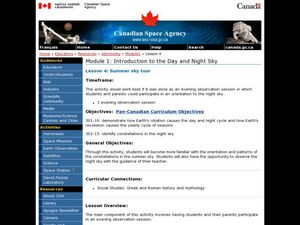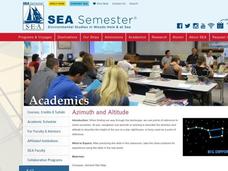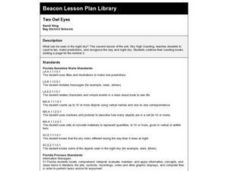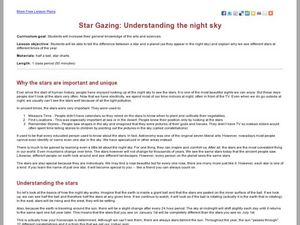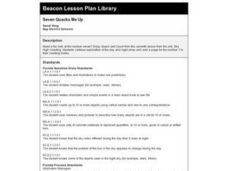Curated OER
Summer Sky Tour
Students explore space science by participating in a constellation identification activity. In this astronomy lesson, students view star charts based on the different seasons and define a list of astronomy related terms. Students...
Curated OER
Sunrise, Sunset: Quickly Go the Days
Learners explore the concept of daylight. In this daylight lesson, students compare the amount of daylight on a particular day in Anchorage compared with daylight where they live. Learners color maps of the US according to amount of...
Curated OER
Day and Night
Students using experiments try to demonstrate how observations can be affected by the cycles of night and day.
Curated OER
The Starry Night Time and Day Time
Second graders complete a unit of lessons on the solar system. They complete various art projects inspired by Van Gogh's 'Starry Night,' create a moon phases book, create a moon phase wind chime, develop a timeline of space exploration,...
Curated OER
Exploring the Night Sky: Fall/Winter
Students explain how moon phases occur. They explain three ways that the night sky has been used through history. Students locate some of the constellations in the night sky. They discuss stories and myths surrounding stars.
Curated OER
Night Sky
Students discover why stars can only be seen at night. They participate in a read aloud of, "Night Sky" by Carole Stott and, "Switch on the Night" by Ray Bradbury. Using the sky objects described in the readings, they brainstorm and list...
Curated OER
Sky 2: Shadows
Students explore space science by participating in a shadow experiment. In this sky observation lesson, students identify how the sun creates different sized shadows by moving across the horizon. Students utilize yard sticks, markers,...
K5 Learning
Sun, Stars and Moon
Learners read about the objects we see in our night and day skies before answering five short answer comprehension questions.
Colorado State University
What Is a "Model"?
Model the transfer of energy during a typical 24-hour period. Young scholars use a game-like approach to learning the patterns of heat transfer through the day and night. Groups of four exchange different tokens as the energy...
Curated OER
Water Works Wonders
Students examine where water is found in the world, how we use it, and the various forms it takes. They observe the refraction of light through a prism, record the day and night sky over a week's time, and create a topographic model of...
Curated OER
Day And Night
For this short excerpt worksheet, students read and discuss what they can see at night, what they can see during the day and then answer three comprehension questions.
Curated OER
Sky Watchers: Ancient Astronomers
Students close their eyes and picture the sky. They are asked to brainstorm things they may see in the course of a night and day, such as the movement of the sun, moon, and stars. Students work in groups to coduct their research. They...
Curated OER
Azimuth and Altitude
Learners use a compass and their hands to find positions of stars and planets in the night sky or of the sun during the day.
Curated OER
What is April Fool's Day?
Students explore humor by creating their own practical joke. In this April Fool's Day lesson, students read different situations in which practical jokes were taken too far. Students discuss their reactions to the jokes and identify when...
Curated OER
Sky High Counting
Students learn the characteristics of the day and night sky, and the movement of the sun across the sky as they learn to count to ten in this unit.
Curated OER
Two Owl Eyes
First graders listen to the story, Olivia Counts, and demonstrate counting to ten. They make predictions, and recognize the day and night sky. They add page number 2 to their counting books.
Curated OER
The Starry Night
Second graders fingerpaint their own interpretations of Vincent Van Gogh's Starry Night.
Curated OER
Guided Reading "In the Night Sky"
Learners participate in a variety of reading exercises, such as choral reading and reading response journal, to reinforce concepts about space and nocturnal animals.
Curated OER
Star Gazing: Understanding the night sky
Young scholars observe star charts to understand the difference between a star and a planet. In this star lesson plan, students also explain why we see different stars at different times of the year.
Curated OER
Sky 2: Shadows
students will explore making shadows and tracking the movement of an object over the course of a day to look for patterns. It is best to couple this shadow activity with reading the book, Bear Shadow, and making a map of Bear's...
Curated OER
Shadow Trackers
Students use online websites to inquire about the cycle of day and night. In this web based lesson, students are able to see the movement of the sun and Earth. Students can look at different parts of the Earth as if they were on the Sun...
Curated OER
Seven Quacks Me Up
First graders explore the day and night sky and add a page for the number 7 to their countiing books.
Curated OER
Science: Day and Night
Students listen to the Sky Tellers Native American story, "Ant Dances for Light," and illustrate it. They observe how Earth's rotation results in periods of darkness and light. Students investigate how day length varies throughout the...
Marcia's Science Teaching Ideas
Observing the Moon Activity
In this moon worksheet, students observe the moon on three consecutive nights and draw their observations. They answer questions about the phases of the moon and its position in the night sky. They identify the position of the sun, earth...


